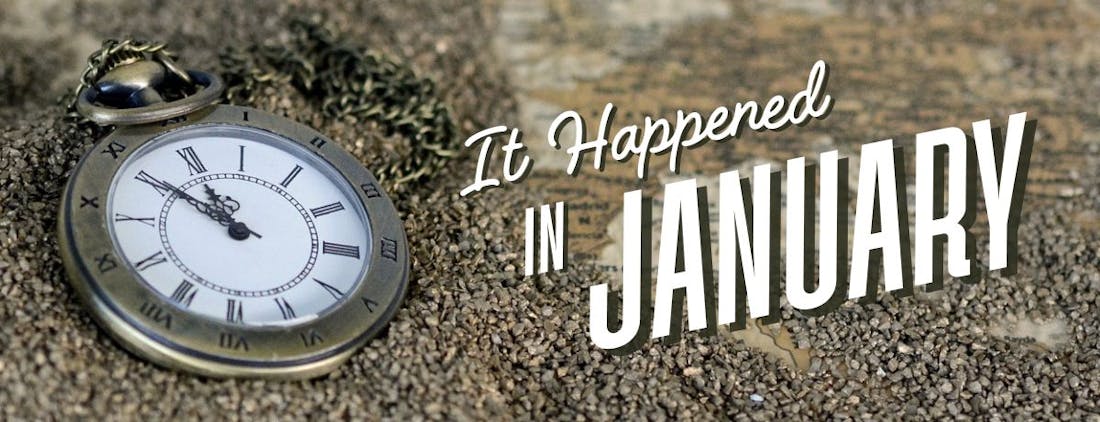
View Historical Events by Day: What Happened on January 5 in History?
Explore the historical events that shaped our world on January 5th. From major milestones to cultural achievements, see what happened on this day in history. Dates for earlier events may be approximate.
Note: Sources for the historical content shown, include research and reviews of relevant Online History Resources or printed material. When possible, we show a link to a source which provides additional or unique perspective about the event.
We do our best to provide accurate information but would appreciate being notified if any incorrect information is found. You may do so by using our Feedback link.
Henry II becomes King of Germany after the death of his father, Henry the Quarrelsome.
King Canute the Great of England and Denmark dies, leading to disputes over succession.
Edward the Confessor, King of England, dies, leading to a succession crisis and the events of the Norman Conquest.
Pope Clement V is elected, beginning the Avignon Papacy.
Robert the Bruce renounces his allegiance to England's King Edward I, beginning his campaign for the Scottish throne.
King Edward III of England creates the Knights of the Garter, an elite chivalric order.
A peace treaty is signed between Sweden and Denmark, known as the Treaty of Gottorp.
Albert II, Holy Roman Emperor, dies, leaving Frederick III as his successor.
During the Wars of the Roses, the Duke of Clarence, brother of Edward IV, is executed for treason.
The University of Copenhagen is founded in Denmark.
Birth of Anne of Brittany, future queen consort of France and duchess of Brittany.
The Battle of Nancy takes place, where Duke Charles the Bold of Burgundy is killed.
Pope Clement VII forbids Henry VIII from remarrying until his first marriage is resolved and forbidding the clergy in England from trying the case. More
The election of Pope Julius III takes place, succeeding Pope Paul IV.
Antonio de Espinosa, Spanish viceroy of Peru, issues an ordinance banning foreign silver coins in the Americas.
The Treaty of Nonsuch is signed between England and the Dutch rebels, formalizing their alliance against Spain.
The publication of Galileo Galilei's "Sidereus Nuncius" announces the discovery of Jupiter's moons.
Italian astronomer Galileo Galilei observes Neptune but mistakes it for a fixed star.
Isaac Newton's "Principia Mathematica" is published, outlining the laws of motion and universal gravitation.
The Duke of Marlborough is dismissed from his command by Queen Anne during the War of the Spanish Succession.
Columbia University in New York City holds its first classes.
Afghani ruler Ahmad Shah Durrani defeats the Marathas in the Battle of Barari Ghat, consolidating power in India.
The first traveler's cheques are issued by the London Credit Exchange Company.
Davy Crockett arrives in Texas, joining the fight for independence from Mexico.
The Golden Gate Bridge construction starts. Joseph B. Strauss led the way as Chief Engineer of the Golden Gate Bridge and he is is also credited as being the leading force behind seeing the Golden Gate Bridge become a reality. The bridge was completed on May May 28, 1937. More
Iceland becomes the first country to legalize abortion.
The Eisenhower Doctrine is announced, providing military and economic aid to Middle Eastern countries threatened by communism.
Alexander Dubček comes to power in Czechoslovakia, beginning the period known as the Prague Spring.
President Richard Nixon signs a bill authorizing $5.5 billion for the development of a reusable winged space transportation system commonly known as the space shuttle. The reusability of the shuttle’s components was expected to provide regular access to space to many customers, while at the same time reducing costs. The spacecraft was to be designed to carry seven astronauts and up to 50,000 pounds of cargo into orbits a few hundred miles from Earth. NASA launched Columbia, the first space shuttle, in 1981. More
Democrats win both Senate seats in Georgia's runoff elections, giving them control of the U.S. Senate.






.png?auto=format,compress&fit=crop&w=280&h=280&q=93)







.jpg?format,compress&fit=crop&w=280&h=280&q=93)
.jpg?format,compress&fit=crop&w=280&h=280&q=93)












